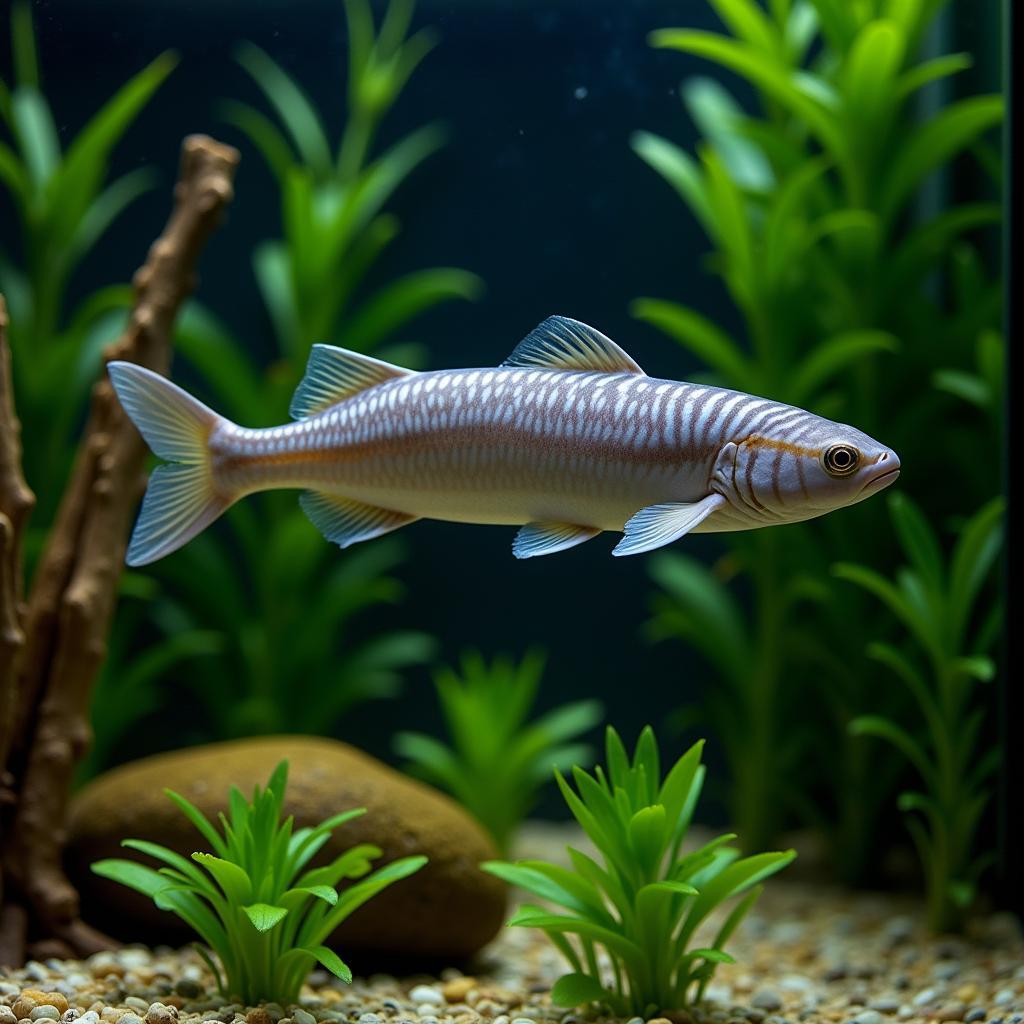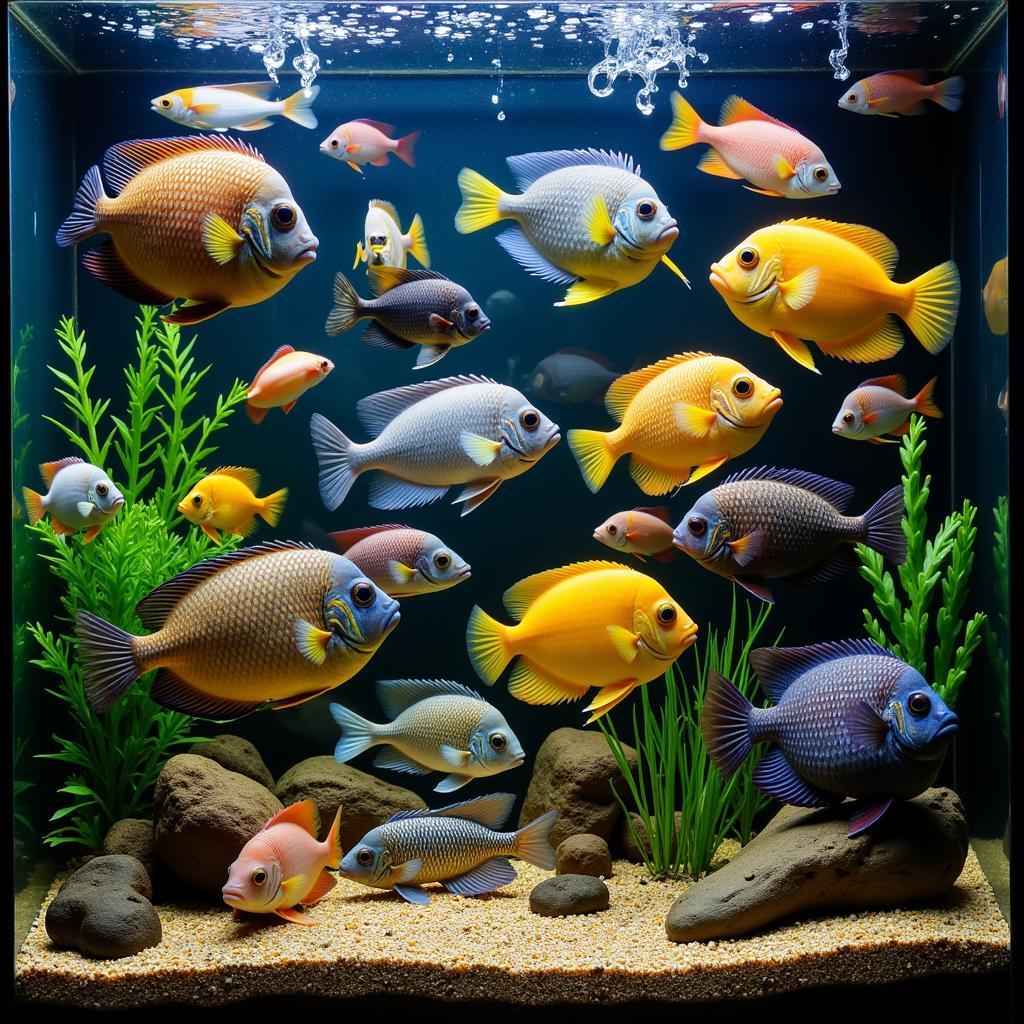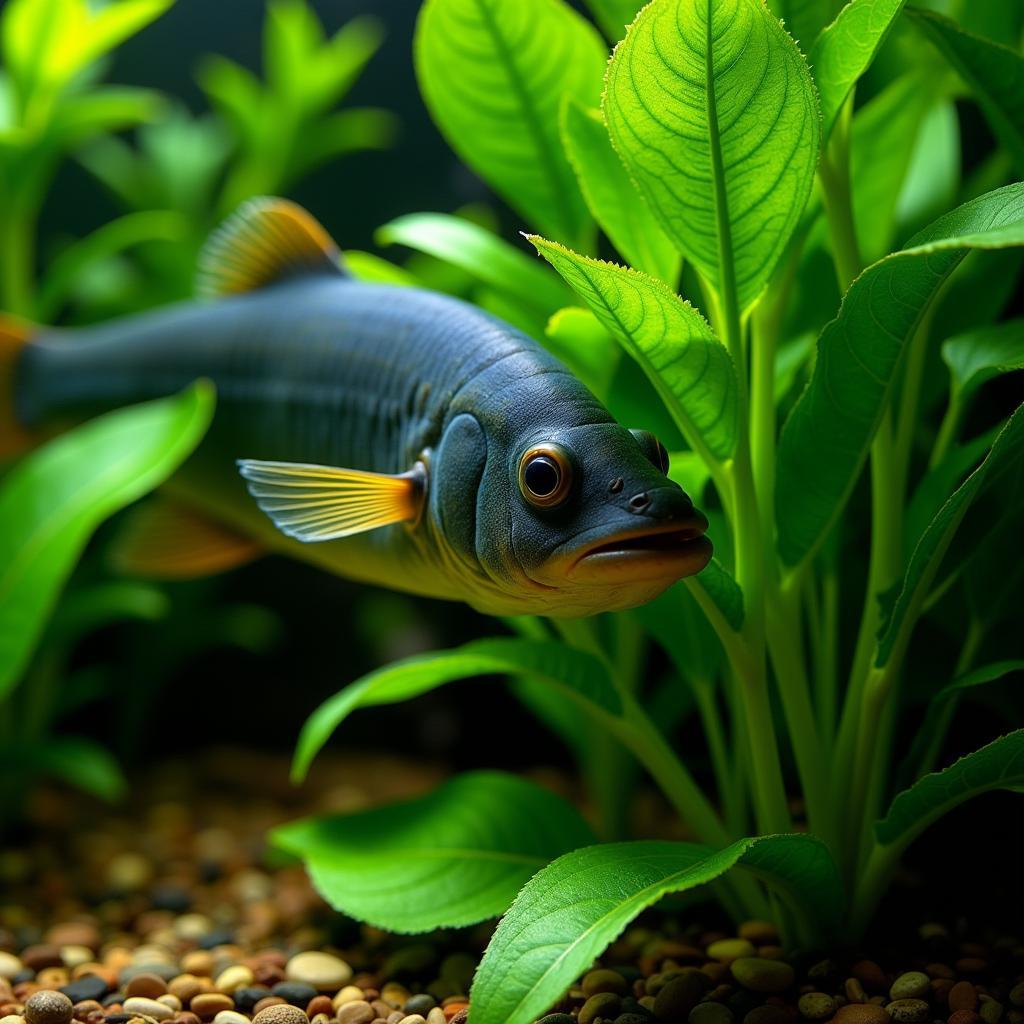African Knife Fish and Cichlids: A Tank Mate Guide
The African knife fish, an intriguing species with its elongated body and nocturnal habits, is a unique addition to any home aquarium. But can these fascinating fish coexist peacefully with other popular choices, particularly the vibrant and diverse African cichlids?
 African Knife Fish in Aquarium
African Knife Fish in Aquarium
Understanding African Knife Fish
Native to the slow-moving, often murky waters of West and Central Africa, African knife fish (Xenomystus nigri) are not true eels but rather belong to the family Notopteridae. These fish are characterized by:
- Unique Morphology: Their elongated bodies, typically reaching up to 16 inches in captivity, are adorned with a long anal fin that extends almost the entire length of their underside, propelling them through the water with an undulating motion.
- Nocturnal Nature: African knife fish are primarily active at night, spending their days concealed among plants, rocks, or other hiding spots.
- Weak Eyesight, Strong Electroreception: Their eyesight is poor, but they possess a specialized organ that allows them to detect electrical fields, aiding in navigation and prey detection in their natural turbid habitats.
- Carnivorous Diet: These fish are carnivores, feeding on insects, worms, crustaceans, and small fish in the wild.
African Cichlids: A Diverse Group
African cichlids are renowned for their striking colors, diverse behaviors, and adaptability. Originating from the Rift Valley lakes of East Africa, these fish exhibit an impressive range of:
- Coloration and Patterns: From vibrant blues and yellows to striking oranges and reds, African cichlids come in a dazzling array of colors and patterns, often with males displaying more intense hues.
- Temperament and Social Interactions: While some cichlid species are relatively peaceful, many are known for their territorial behavior, especially during breeding seasons.
- Dietary Needs: Cichlids exhibit a variety of feeding preferences, ranging from herbivores to carnivores and omnivores, with specialized adaptations for their specific dietary needs.
 African Cichlids in a Vibrant Aquarium
African Cichlids in a Vibrant Aquarium
Compatibility Challenges: African Knife Fish with Cichlids
While the prospect of housing these two fascinating fish types together might seem appealing, several factors can pose challenges to their compatibility:
- Aggression and Territoriality: Many African cichlid species, especially males, can be highly aggressive and territorial, potentially viewing the slow-moving knife fish as a threat or competitor for resources.
- Size Differences and Predatory Instincts: Larger cichlid species might view smaller knife fish as prey, particularly if they are housed in a tank that does not offer adequate hiding spaces for the knife fish.
- Dietary Overlap: Both African knife fish and carnivorous or omnivorous cichlids share dietary preferences, potentially leading to competition for food and aggression during feeding times.
- Environmental Parameters: While both fish types prefer slightly alkaline water conditions, African cichlids generally thrive in water with higher pH levels than African knife fish, requiring careful monitoring and adjustments to ensure the well-being of both species.
Can African Knife Fish Live with Cichlids?
Despite the challenges, housing African knife fish with certain cichlid species can be possible under specific conditions:
- Cichlid Selection is Crucial: Opting for peaceful cichlid species known for their less aggressive nature and compatibility with tank mates is paramount. Consider dwarf cichlids, such as shell dwellers, or species like Kribensis cichlids, which tend to be less territorial.
- Tank Size and Setup Matter: Providing a spacious tank with ample hiding spots for the knife fish is essential. Rocks, caves, dense plants, and driftwood can create a more secure environment for the knife fish to retreat to during the day or when feeling threatened.
- Careful Observation and Intervention: Closely monitor the behavior of both the knife fish and cichlids, especially during the initial introduction period and feeding times. Be prepared to intervene or separate the fish if necessary to prevent aggression or injuries.
Tips for Success:
- Quarantine New Arrivals: Before introducing any new fish to the main tank, quarantine them for a few weeks to observe their health and behavior and prevent the spread of potential diseases.
- Introduce the Knife Fish Last: Adding the knife fish to the established cichlid tank last allows it to acclimate to the environment and reduces the likelihood of territorial disputes.
- Provide a Varied Diet: Offer a diverse diet to both the knife fish and cichlids, ensuring that each species receives adequate nutrition and reducing competition for food.
- Maintain Optimal Water Parameters: Regularly test and adjust water parameters to ensure they meet the specific needs of both fish types, promoting their overall health and well-being.
 African Knife Fish Seeking Refuge
African Knife Fish Seeking Refuge
Expert Insight
“While combining African knife fish and cichlids can be challenging, careful planning and diligent observation can lead to a successful and fascinating community tank,” says Dr. Amina Diallo, an aquarist specializing in African fish species. “Choosing compatible cichlid species, providing a spacious and well-structured environment, and maintaining optimal water parameters are crucial factors in ensuring the well-being of both fish types.”
Conclusion
Housing African Knife Fish With Cichlids requires careful consideration, planning, and a thorough understanding of the needs and behaviors of both species. While not all combinations will be suitable, with the right cichlid selection, tank setup, and attentive care, these fascinating fish can coexist peacefully, creating a captivating and rewarding aquarium experience.
If you have any questions or need further assistance in setting up your African fish community tank, please don’t hesitate to contact us.
Call us at: +255768904061
Email us at: kaka.mag@gmail.com
Visit us at: Mbarali DC Mawindi, Kangaga, Tanzania.
Our dedicated team is available 24/7 to assist you in creating a thriving aquatic environment for your finned companions.


